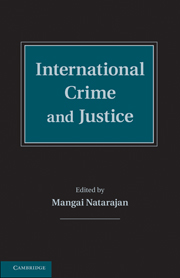Book contents
- Frontmatter
- Contents
- List of Figures
- List of Tables
- List of Contributors
- Foreword
- Preface
- Introduction
- Part I International Criminology
- Part II Law, Punishment, and Crime Control Philosophies of the World
- Part III Transnational Crime
- Part IV Organized Crime and Terrorism
- Part V International crime
- Part VI Delivering International Justice
- Part VII International Cooperation and Criminal Justice
- 54 World Policing Models
- 55 Crossborder Policing
- 56 Challenge and Transition
- 57 The European Union and Judicial Cooperation
- 58 The Longer Arm of the Law
- 59 International Cooperation to Combat Money Laundering
- Part VIII International Research and Crime Statistics
- Part IX International research resources
- World Map
- Index
- References
58 - The Longer Arm of the Law
THE GROWTH AND LIMITS OF INTERNATIONAL LAW ENFORCEMENT AND CRIMINAL JUSTICE COOPERATION
Published online by Cambridge University Press: 05 October 2014
- Frontmatter
- Contents
- List of Figures
- List of Tables
- List of Contributors
- Foreword
- Preface
- Introduction
- Part I International Criminology
- Part II Law, Punishment, and Crime Control Philosophies of the World
- Part III Transnational Crime
- Part IV Organized Crime and Terrorism
- Part V International crime
- Part VI Delivering International Justice
- Part VII International Cooperation and Criminal Justice
- 54 World Policing Models
- 55 Crossborder Policing
- 56 Challenge and Transition
- 57 The European Union and Judicial Cooperation
- 58 The Longer Arm of the Law
- 59 International Cooperation to Combat Money Laundering
- Part VIII International Research and Crime Statistics
- Part IX International research resources
- World Map
- Index
- References
Summary
THE NATURE OF THE PROBLEM
Old Roots, New Growth
The problems of criminals fleeing abroad to avoid prosecution or committing crimes that crosspolitical borders have existed since ancient times. Smuggling may be the world’s second oldest profession. Agreements among states to return fugitives have been recorded since ancient Egypt. In today’s world of porous borders the possibilities for transnational crime and fugitivity have multiplied a thousandfold.
As of the twenty-first century nation states are expanding institutions of international cooperation in law enforcement and criminal justice matters. Compared to the beginning of the nineteenth century when international cooperation was virtually nonexistent and the prevailing assumption was that “the courts of no country enforce the laws of another country,” today’s world is strikingly different. A web of bilateral, regional, and international agreements, conventions (treaties) and institutions addressing transnational crime and criminals are proliferating (Andreas & Nadelmann, 2006).
This chapter traces these developments and identifies gaps that remain in the canopy of international law enforcement and criminal justice. These developments began slowly in the nineteenth century, took of after World War II, and accelerated in the 1990s.
Formerly criminologists dealt with crime in other countries under the rubric of “comparative criminology.” Interrelatedness as such became a focus of criminological concern in 1974 with the phrase, “transnational crime,” which is not a legally-defined crime but rather refers to criminal activities, transactions, or schemes that violate the laws of more than one country or have a direct impact on a foreign country (Mueller, 1999). In 1996 the National Institute of Justice (NIJ) established its International Center for the study of crime and justice.
- Type
- Chapter
- Information
- International Crime and Justice , pp. 437 - 444Publisher: Cambridge University PressPrint publication year: 2010
References
- 1
- Cited by



